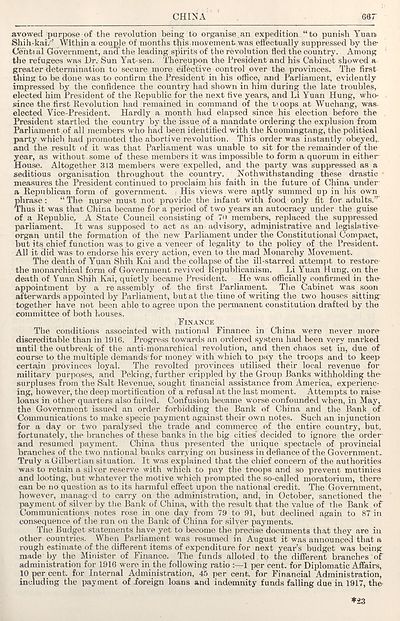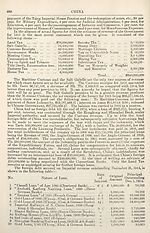1917
(761) Page 667
Download files
Complete book:
Individual page:
Thumbnail gallery: Grid view | List view

CHINA
687
avowed purpose of the revolution being to organise an expedition “to punish Yuan
Shih-kai.'’ Within a couple of naonths this movement was effectually suppressed by the-
Cehtial Government, aha the leading spirits of the revolution tied the country. Among
the refugees was Dr. Sun Yat-sen. Thereupon the President and his Cabinet showed a
greater determination to secure more eifective control over the provinces. The first
thing to be done was to confirm the President in his otiice, and Parliament, evidently
impressed by the confidence the country had shown in him during the late troubles,
elected him President of the Republic for the next five years, and Li Yuan Hung, who-
since the first Revolution had remained in command of the t>oops at Wuchang, was
elected Vice-President. Hardly a month had elapsed since his election before the
President startled the country by the issue of a mandate ordering the explusion from
Parliament of all members who had been identified with the Kuomingtang, the political
party which had promoted the abortive revolution. This order was instantly obeyed,,
and the result of it was that Parliament was unable to sit for the remainder of the
year, as without some of these members it was impossible to form a quorum in either
House. Altogether 313 members were expelled, and the party was suppressed as a
seditious organisation throughout the country. Nothwithstanding these drastic
measures the President continued to proclaim his faith in the future of China under
a Republican form of government. His views were aptly summed up in his own
phrase: “The nurse must not provide the infant with food only fit for adults."
Thus it was that China became for a period of two years an autocracy under the guise
of a Republic, A State Council consisting of 7<> members, replaced the suppressed
parliament. It was supposed to act as an advisory, administrative and legislative-
organ until the formation of the new Parliament under the Constitutional Compact,
but its chief function was to give a veneer of legality to the policy of the President.
All it did was to endorse his every action, even to the mad Monarchy Movement.
The death of Yuan Shih Kai and the collapse of the ill-starred attempt to restore
the monarchical form of Government revived Republicanism. Li Yuan Hung, on the
death of Tuan Shjh Kai, quietly became President. He was officially confirmed in the
appointment by a re assembly of the first Parliament. The Cabinet was soon
afterwards appointed by Parliament, but at the time of writing the two houses sitting-
together have not been able to agree upon the permanent constitution drafted by the
committee of both houses.
: Finance
The conditions associated with national Finance in China were never more
discreditable than in 1916. Progress towards an ordered system had been very marked
until the outbreak of the anti-monarchical revolution, and then chaos set in, due of
course to the multiple demands for money with which to pay the troops and to keep
certain provinces loyal. The revolted provinces utilised their local revenue for
military purposes, and Peking, further crippled by the Group Banks withholding the-
surpluses from the Salt Revenue, sought financial assistance from America, experienc¬
ing, however, the deep mortification of a refusal at the last moment. Attempts to raise
loans in other quarters also failed. Confusion became worse confounded when, in May,
the Government issued an order forbidding the Bank of China and the Bank of
Communications to make specie payment against their own notes. Such an injunction
for a day or two paralysed the trade and commerce of the entire country, but,
fortunately, the branches of these banks in the big cities decided to ignore the order
and resumed payment. China thus presented the unique spectacle of provincial
branches of the two national banks carrying on business in defiance of the Government.
Truly a Gilbertian situation. It was explained that the chief concern of the authorities
was to retain a silver reserve with which to pay the troops and so prevent mutinies
and looting, but whatever the motive which prompted the so-called moratorium, there
can be no question as to its harmful effect upon the national credit. The Government,
however, managed to carry on the administration, and, in October, sanctioned the
payment of silver by the Bank of China, with the result that the value of the Bank of
Communications notes rose in one day from 79 to 91, but declined again to 87 in
consequence of the run on the Bank of China for silver payments.
The Budget statements have yet to become the precise documents that they are in
other countries. When Parliament was resumed in August it was announced that a
i-ough estimate of the different items of expenditure for next year’s budget was being
made by the Minister of Finance. The funds alio ted tq the different branches of
administration for 1916 were in the following ratio :—l per cent, for Diplomatic Affairs,
10 per cent, for Internal Administration, 45 per cent, for Financial Administration,
including the payment of foreign loans and indemnity funds falling due in 1917, the
*23
687
avowed purpose of the revolution being to organise an expedition “to punish Yuan
Shih-kai.'’ Within a couple of naonths this movement was effectually suppressed by the-
Cehtial Government, aha the leading spirits of the revolution tied the country. Among
the refugees was Dr. Sun Yat-sen. Thereupon the President and his Cabinet showed a
greater determination to secure more eifective control over the provinces. The first
thing to be done was to confirm the President in his otiice, and Parliament, evidently
impressed by the confidence the country had shown in him during the late troubles,
elected him President of the Republic for the next five years, and Li Yuan Hung, who-
since the first Revolution had remained in command of the t>oops at Wuchang, was
elected Vice-President. Hardly a month had elapsed since his election before the
President startled the country by the issue of a mandate ordering the explusion from
Parliament of all members who had been identified with the Kuomingtang, the political
party which had promoted the abortive revolution. This order was instantly obeyed,,
and the result of it was that Parliament was unable to sit for the remainder of the
year, as without some of these members it was impossible to form a quorum in either
House. Altogether 313 members were expelled, and the party was suppressed as a
seditious organisation throughout the country. Nothwithstanding these drastic
measures the President continued to proclaim his faith in the future of China under
a Republican form of government. His views were aptly summed up in his own
phrase: “The nurse must not provide the infant with food only fit for adults."
Thus it was that China became for a period of two years an autocracy under the guise
of a Republic, A State Council consisting of 7<> members, replaced the suppressed
parliament. It was supposed to act as an advisory, administrative and legislative-
organ until the formation of the new Parliament under the Constitutional Compact,
but its chief function was to give a veneer of legality to the policy of the President.
All it did was to endorse his every action, even to the mad Monarchy Movement.
The death of Yuan Shih Kai and the collapse of the ill-starred attempt to restore
the monarchical form of Government revived Republicanism. Li Yuan Hung, on the
death of Tuan Shjh Kai, quietly became President. He was officially confirmed in the
appointment by a re assembly of the first Parliament. The Cabinet was soon
afterwards appointed by Parliament, but at the time of writing the two houses sitting-
together have not been able to agree upon the permanent constitution drafted by the
committee of both houses.
: Finance
The conditions associated with national Finance in China were never more
discreditable than in 1916. Progress towards an ordered system had been very marked
until the outbreak of the anti-monarchical revolution, and then chaos set in, due of
course to the multiple demands for money with which to pay the troops and to keep
certain provinces loyal. The revolted provinces utilised their local revenue for
military purposes, and Peking, further crippled by the Group Banks withholding the-
surpluses from the Salt Revenue, sought financial assistance from America, experienc¬
ing, however, the deep mortification of a refusal at the last moment. Attempts to raise
loans in other quarters also failed. Confusion became worse confounded when, in May,
the Government issued an order forbidding the Bank of China and the Bank of
Communications to make specie payment against their own notes. Such an injunction
for a day or two paralysed the trade and commerce of the entire country, but,
fortunately, the branches of these banks in the big cities decided to ignore the order
and resumed payment. China thus presented the unique spectacle of provincial
branches of the two national banks carrying on business in defiance of the Government.
Truly a Gilbertian situation. It was explained that the chief concern of the authorities
was to retain a silver reserve with which to pay the troops and so prevent mutinies
and looting, but whatever the motive which prompted the so-called moratorium, there
can be no question as to its harmful effect upon the national credit. The Government,
however, managed to carry on the administration, and, in October, sanctioned the
payment of silver by the Bank of China, with the result that the value of the Bank of
Communications notes rose in one day from 79 to 91, but declined again to 87 in
consequence of the run on the Bank of China for silver payments.
The Budget statements have yet to become the precise documents that they are in
other countries. When Parliament was resumed in August it was announced that a
i-ough estimate of the different items of expenditure for next year’s budget was being
made by the Minister of Finance. The funds alio ted tq the different branches of
administration for 1916 were in the following ratio :—l per cent, for Diplomatic Affairs,
10 per cent, for Internal Administration, 45 per cent, for Financial Administration,
including the payment of foreign loans and indemnity funds falling due in 1917, the
*23
Set display mode to:
![]() Universal Viewer |
Universal Viewer | ![]() Mirador |
Large image | Transcription
Mirador |
Large image | Transcription
Images and transcriptions on this page, including medium image downloads, may be used under the Creative Commons Attribution 4.0 International Licence unless otherwise stated. ![]()
| Asian directories and chronicles > 1917 > (761) Page 667 |
|---|
| Permanent URL | https://digital.nls.uk/194542201 |
|---|
| Attribution and copyright: |
|
|---|---|
| Description | Volumes from the Asian 'Directory and Chronicle' series covering 1917-1941, but missing 1919 and 1923. Compiled annually from a multiplicity of local sources and research. They provide listings of each country's active corporations, foreign residents and government agencies of all nationalities for that year, together with their addresses. Content includes: various treaties; coverage of conflicts; currencies and taxes; consular fees; weights and measures; public holidays; festivals and traditions. A source of information for both Western states and communities of foreigners living in Asia. Published by Hongkong Daily Press. |
|---|---|
| Shelfmark | H3.86.1303 |
| Additional NLS resources: |
![[Page 666]China](https://deriv.nls.uk/dcn4/1945/4219/194542190.4.jpg)
